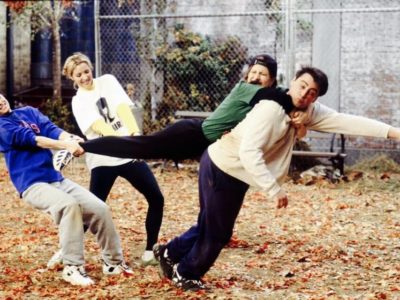Before college, I embedded myself in the social world with a certain sense of ease. Growing up in a small community, my group of tight-knit friends followed me for 13 years. Initial elementary school buddies effortlessly established my high school clique. While I loved these people dearly, I desperately longed to leave behind the comfortable bonds from my past for the great unknown of life after high school.
At my graduation party, strange faces I barely knew offered their priceless insight on “the best years of your life,” where you meet the people you’ll be friends with forever. I nodded and smiled on autopilot; I knew the words they’d say before they’d even opened their mouths. With these mantras previously programmed into me, I eagerly awaited the moment when I could press play.
After the joy (or hell) of college tours, applications and acceptance letters, I found a new playing ground at the University of San Diego. To my surprise, it unfolded just like the fairytale I imagined. Using the über-friendly approach out of my unofficial college handbook, I soon fell into a new circle of friends. Since we belonged to the same pre-orientation group and lived in the same dorm, we found common ground among our mismatched interests and backgrounds. Soon, I stopped introducing myself to strangers in the hall and began ignoring the “I miss you” texts from high school classmates. I found my forever friends.
We engaged in typical squad behavior. It started with a 10-person iPhone group text that drained my battery, but fed my ego. We always reserved the same corner table in the dining pavilion, and I usually found one of them curled up in my bed napping between classes. Every Friday night we ran around Mission Beach, begging upperclassmen to let us into their parties. I remember the looks we got when we were together; hysteric laughs floated out of our fortress of first-year friendship into the ears of jealous peers passing by.
But then, slowly, it began to shift. People complained about the group text blowing up their phones. Lunch plan cancellations became a habit and my bed always eerily made. Well, midterms are coming up, I reasoned.
When second semester hit, Greek life recruited my friends and Friday night plans. To be honest, I didn’t give it much thought: Smitten with a new boyfriend, I spent less time on campus. Since my friendship with my first-year friends started in college, I figured the bonds would be strong enough to withstand any social or romantic turbulence on the journey.
Over the next few months, I scrolled through Instagram, watching my friends’ lives unfold. They posed with smiling strangers, taking shots at a party I wasn’t invited to with arms wrapped around their “Day 1 Homie.” Although they only appeared in my life when we happened to run into each other around campus, I still felt some sort of claim on them. I desperately tried placing them into memorable picture-worthy experiences we weren’t currently having.
While I lived in a universe where my initial squad and I were still tighter than ever, I didn’t notice college life untying the knots. As members of my first-year group began seeing new people, I saw these old friends with blind eyes.
At first, I felt angry with myself. Instead of branching out while people were still forming their communities, I’d been complacent with the first people I met. Without my squad by my side, I became an outsider on campus surrounded by 5,000 18 to 22-year-old peers.
When my disappointment dissolved, I realized something important: College is about discovering who you are. My friends found pieces of themselves in the new groups they joined and the new people they met. Although I didn’t fall into another friend group, I’m starting to think I wasn’t supposed to.
I grew up comfortably in the same social circle for 13 years. This security blanket rarely challenged me to grow or change. If I wanted a chance for self-discovery, I couldn’t fall into another community in college just as easily, or even at all.
Now, I embrace my role as a nomad. I jump from group to group, and connect with friends over various interests. I talk with a friend about Sundance films over coffee and sing along at a Shakey Graves concert with another. I laugh with my staff in the newspaper office about a Greek life story, and cheer my calculus buddy on at her soccer games.
Separating individuals from their group allows me to see them as three-dimensional characters. My ability to uncover my own beliefs and passions lies in the secret of surrounding myself with people who both align and challenge these discoveries. Through one-on-one interactions with my peers, I’ve stumbled upon an interest for independent film and the indie music scene. Also, conversations sparked through these new relationships developed my flirtatious relationship with photography and poetry.
So, yes, maybe I’m a fool for thinking my freshmen friends would be forever. And maybe I’m a fool for not finding another group to fit into. But if I wasn’t that fool, maybe I wouldn’t be on my way to finding myself.



















